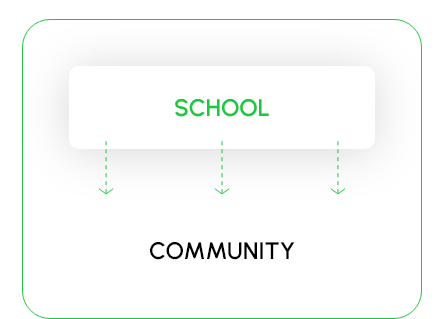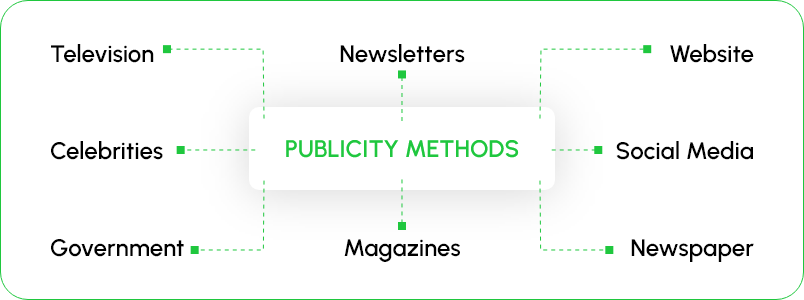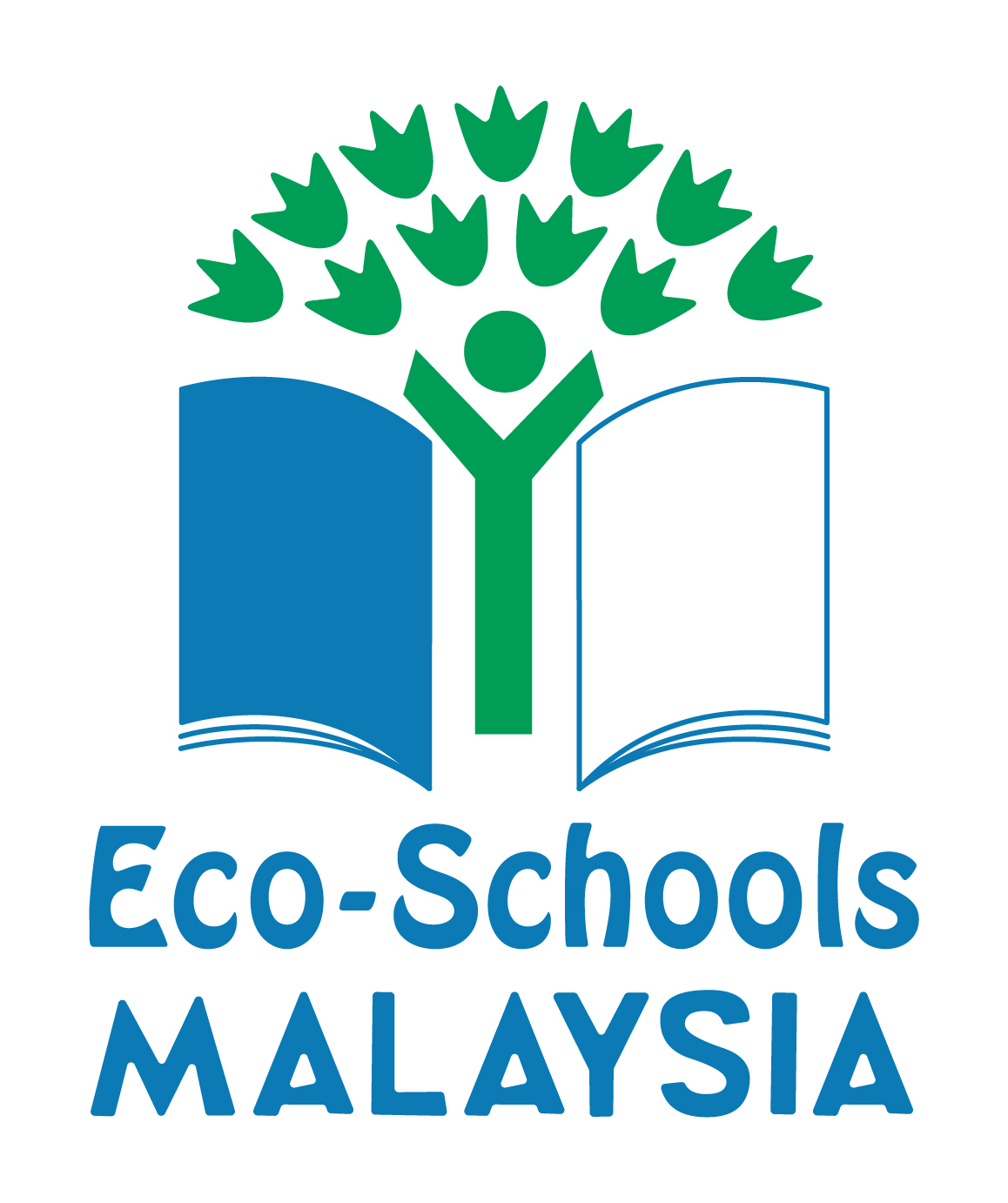The Eco-Schools Seven Steps Process
& Performance Indicators
Learning with the Eco-Schools Seven Steps
The steps are intended to be flexible enough to accommodate any school context, and environmental themes are the ‘means’ to bring about change through active involvement of children through a rigorous pedagogical process. The nature and the order of the Seven Steps allow for the incremental change in sustainability literacy through active learning as the actions of students improve the environmental performance of the whole institutions starting first with themselves. This process empowers them with the confidence to continue to positively influence their own self and make the world a better place to live in.
The Seven Steps are by design child-centered with teachers acting as facilitators. Teachers do not only provide instructions and assessment inputs but are also co-learners; they co-create the learning journey in a fast-changing world where information is available at the press of a button. The pedagogical approach as an iterative process requires the learners to be flexible, curious and stay positive as they learn that the world is far from ideal. This encourages meta-cognition or learning to learn, which is an important skill for lifelong learning. The Seven Steps are aligned to the four pillars of learning – learning to know, to do, to be and to live together.
A new rubric system has been developed, which schools can use to track their progress and understand the Performance Indicators for achieving the Eco-Schools Green Flag.

The Seven-Step process is the basic framework that guides an Eco-School to plan and implement the learning journey.

Representative of the school community it directs and facilitates the sustainability path of the whole Institution and develops a cadre of future sustainability leaders.
Transferable skills: Leadership | Listening | Respect | Facilitation | Empathy | Cooperation | Negotiation
The first step of the Eco-Schools programme involves establishing a viable Eco Committee within the organisational structure of the institution. The Committee aims to direct and address all phases of the Eco-Schools programme. It is the driving force of the programme and ensures that students are at the centre of the process as other steps are carried out.
The committee empowers children for leadership and democratic values. It provides them with an experience of being aspirational and believing in their abilities to be change makers. The most important learning they acquire is to take responsibility with empathy and understand the complexity of decision making in a multi-stakeholder environment. In the process, they learn to debate, negotiate, respect different viewpoints, take decisions through building consensus and work in a team. The nature of this step calls for controlling emotions, punctuality and regular participation and a sense of volunteerism for a larger societal good.
| Role of Stakeholder Eco-Schools Step | Students | Teachers | Non-Teaching Staff | School Leadership | Parents | Other Community Stakeholders: Municipality, Neighbourhood |
|---|---|---|---|---|---|---|
| 1. Eco Committee | Key actors | Facilitators | Facilitators | Facilitate and support implementation of decisions of the Eco- Committee | Connect learning to nomes Professional experts | Provide context to actions |
| 2. Sustainability Audit | Key actors | Facilitators | Facilitators and Data providers | Facilitate and receive the review findings to prontise | Connect learning to nomes Professional experts | Provide expertise and context to prioritise and take actions |
| 3. Development of Action Plan | Key actors in the development of the plan and in its implementation | Facilitators, provide expertise andrare key actors | Provide expertise, facilitators and key actors | Facilitate and provide commitment, support, resources and engagement for the proposed actions | Support the Action Plan through men participation and resource mobilisation | Support the Action Plan through different resources and through wider community engagement |
| 4. Monitoring and Evaluation | Lead the implementations, collect and analyse data | Facilitators, key actors and provide the tools for data collection and analysis. | Facilitators and key actors and data providers | Facilitators and key actors | Facilitators and key actors | Acknowledge and support / promote the actions |
| 5. Curriculum Linkages | Contribute to the learning goals, reflect on the learning achievement based on indicators | Plan the connections and synergies with the curriculum. Facilitate the curriculum implementation. | Support the various steps to achieve the curriculum objectives. | Facilitate and integrate a whole institution approach | Acknowledge and support their children’s learning in everyday life | Acknowledge and provide flexibility |
| 6. Inform and involve | Prepare, present and share the environmental and educational impacts to the whole school community | Facilitators | Facilitators | Facilitate and receive suggestions, provide support for the next cycle of the programme | Learn, acknowledge and support their children’s learning in everyday life. Facilitate wider dissemination | Learn, give feedback and support for the next cycle of the programme |
| 7. Eco Code | Summarise the learning in terms of the Eco Code (values and attitudes) and follow it | Facilitate, follow and model the Eco Code | Facilitate, follow and model the Eco Code | Facilitate, follow and integrate the Eco Code in the whole institutional ethos | Facilitate and follow the Eco Code | Scale up the ethos in the communities |
Performance Indicators
- Students are the driving force of the Eco Committee.
- Eco Committee continuation. Eco Committee members remain on the committee onto the second year to ensure continuity and a smooth handover into the next cycle.
- The Eco Committee meets regularly.
- The Eco Committee minutes are recorded. Key decisions taken are documented and submitted with the Green Flag application.
- Sustainable participation in the Committee. The number of students on the Eco Committee is sufficient and efficient.
- Eco Committee meetings are chaired by students.
- The Eco Committee is visible.
- The Eco Committee is elected or nominated by students.
Election, Nomination and Selection
The Eco Committee needs to be as representative as possible, across stakeholders and age/year groups. Some schools go through an entire election process with manifestos, elections speeches, posters, ballots, to fill different positions on the Eco Committee! Having an elected committee celebrates representation and raises the profile of the Eco Committee.
Self-nomination or nomination of others is another popular way to build the Eco Committee. Volunteer students, teachers and other members of the school community express their interest and register with the committee! Selection of Eco Committee members by teachers or other staff is not encouraged.Good quality meeting minutes have:
- A clear outline of the agenda
- A list of attendees
- A list of actions taken before the meeting
- A list of action points for next time, with a delegated responsibility

The process to understand the biophysical environment, auditing sustainability and identifying scope for improvement.
Transferable skills: : Inquiry | Independent Learning | Number Sense | Creativity | Reflection | Scientific Investigation
A Sustainability Audit checklist includes all aspects of the school’s impact on the environment and society in relation to the Main and Crosscutting Eco-Schools Themes.
Problem identification is an important skill. The aim of the Sustainability Audit is to identify the status of sustainability in the school and to call for skills to prioritise. The results of the audit are used to derive the Action Plan.
The process of review or audit builds the awareness and sensitivity towards the biophysical environment and its allied problems and increases the theme specific basic understanding or disciplinary knowledge. The experience of investigation develops the attitudes, values and feelings of concern for the environment and the motivation for actively participating in environmental improvement and protection. These learning outcomes are reflected as students develop and implement the Action Plan. The step is just not limited to identifying the environmental challenges but also fills the gap in sustainability literacy that comprises of knowledge, competencies, disposition and behaviours that may drive the problem. In the process, students reflect on their own literacy and relate to the change required at a personal level before they plan for a larger change in the institution. The process builds the skills of research, analysis, curiosity, etc. It is important that the process calls for application of skills of numeracy, language, science that they learn in different subjects. The step encourages the students to develop the skills to use the data, to argue the need and using criteria for prioritisation for change. The conceptual clarity helps them identify the barriers in real life that force our action being ideal. This helps in setting realistic targets and monitoring implementation.
By including experts in the field the process gives students an experience of future careers and an in-depth understanding of the subject. They learn to think and act like a practitioner, which showcases purpose in students’ learning, helps deepen their understanding of issues and most importantly shows the relevance of their actions in their own community.Performance Indicators
- Baselines and end-lines are established.
- The audit is reviewed regularly.
- Student leadership in the Sustainability Audit.
- Distribution of tasks across age groups, stakeholders and curriculum areas.
- Measurement indicators and methods are determined.
- The Sustainability Audit is broader than just environmental performance and includes behaviour, knowledge.

Sustainability embedded through the infusion in curriculum standards, subjects and non-formal leaming spaces and context.
Transferable skills: STEM | Literacy | Inquiry | Systems Thinking | Reflection | Critical Thinking | Design | Collaboration
The Eco-Schools programme is most effective when it is integrated and linked to the school’s curriculum and syllabus, wherever possible.
The role of education is to prepare young people for the expectations of society. Addressing the sustainability challenge is one of the most important issues of our time. The biggest challenge is to not see Eco-Schools as an add-on in different subjects, but as a set of educational processes to be achieved across levels at any educational institution. Mapping the projects based on the Sustainability Audit and the curriculum standards according to subjects and skills is important. The students should be provided with an opportunity to set their targets for sustainability as they do for any subject or behaviour. To avoid curriculum overload it is important that the projects are embedded within the existing curriculum in a meaningful way so that all students benefit from both deeper learning experiences and quality learning in the core foundations of the issues they explore.
The interdisciplinary nature of the subjects creates an opportunity for making a holistic and balanced perspective possible. This would require that the teachers identify key concepts over subjects, explore the connectedness of these subjects and integrate themes by encouraging project-based learning. The action orientation of the Education for Sustainable Development curriculum helps in the development of critical thinking and problem-solving skills.
Performance Indicators
- Carrying out a curriculum audit and integrating the action plan themes.
- Achieving key competencies for sustainability.
- Teaching staff participate in Education for Sustainable Development training.
- The data collected from the Sustainability Audit are used in class.
- Sustainability is embedded in school events / conferences / learning opportunities
Definitions of Curriculum
Whole institution – Curriculum is the delivery component of an institutions’ educational mission, values and theory of learning. It should follow in-depth discussions regarding “what a student should learn” and “how a student can best learn.“
Learning for Action – As applied to education, curriculum is the series of things that students must do and experience by way of developing abilities to do the things well that adults do in life; and to be in all ways the people that they should be as adults.
Subject – Curriculum refers to an interactive system of instruction and learning with specific goals, contents, strategies, measurement and resources. The desired outcome of curriculum is successful transfer and/or development of knowledge, skills and attitudes.

Prioritising plausible actions, setting specific and achievable targets with completion dates and responsibilities.
Transferable skills: Critical Thinking | Planning | Creativity | Time Management | Teamwork | Reflection | Goal Setting
Identifies and lists specific goals for the reduction of impacts as identified in the Sustainability Audit.
This is one of the most significant steps to develop active citizenship amongst students and help plan their activities. Developing action plans is an important transferrable skill that is required at both the personal and professional level. It also helps in developing the skill of anticipation and mapping scenarios by projecting the consequences and potential impact of different decisions.
The Action Plan calls for demonstrating skills for budgeting – estimation of time and money, using criteria for prioritisation and decision making, innovative thinking, divergent and convergent thinking and lots of patience.
The action plan is an opportunity for the learners to practice transformative competencies by questioning the status quo, thinking of new ways to do things, collaborate, resolve differences and dilemmas as they try to optimise the outcomes and most importantly have the courage to take responsibility to bring about change. The process of negotiating an action while keeping all the stakeholders’ interests calls for a demonstration of emotional quotient. The process of negotiating plausible actions gives students an opportunity to recognise values and clarify perceptions and perspectives that often stem from our cultures.Action plan has SMART Goals
Specific: What type of energy are we reducing? By how much?
Measurable: Can we measure improvement in this goal? How will we do that? What evidence can we produce?
Attainable: Something possible and achievable.
Relevant: Baseline as outlined in the sustainability Audit. What is the benchmark, and where do we want to be in relation to that benchmark?
Timebound: Actions are short term: Within the academic year, medium term : Within two years, long term: Over two years – this works is to be continued over the next Eco-Schools cycle.
Performance Indicators
- Action Plan is SMART.
- Action plan indicates areas of action for environmental, social, economic and cultural elements of sustainability.
- Distribution of tasks with student engagement.
- The Action Plan should be publicly available.
- The Action Plan includes communications targets – outputs and outcomes.
- The Action Plan is continuously updated.
- Map out the areas to be improved on campus.
- Whole school approach in Action Plan activities.

Implementing change, tracking the progress towards targets and making amendments where and when necessary.
Transferable skills: Number Sense | Design | Inquiry | Reflection | Teamwork | Photography & Video | Accuracy | Revision
This is carried out by the Eco Committee to ensure that progress towards targets is checked, amendments are made where necessary and success is celebrated.
Implementation, Monitoring and Evaluation is action research. As an exercise to assess progress made towards achieving targets identified in the Action Plan and to identify areas that require further corrective action, students learn to work together with dedication and determination. Effective problem solving requires the ability to investigate and evaluate against a set of agreed criteria.
The process makes them learn the importance of a review system and develop a growth mindset that drives motivation and achievement. The failures and successes as they implement the Action Plan help students develop strategies for being resilient and bouncing back. Reflection is a key learning outcome for transformation and learning to take critical feedback simulates real life situations!Performance Indicators
- Student involvement in monitoring and evaluation.
- There is a clear comparison to Environmental Review measurements.
- Targets are achieved or illustrate positive progress.
- The findings from the Monitoring & Evaluation are displayed in the school and communicated to the school and community members.
To achieve good monitoring, consider the following:
- What are we monitoring?
- How will we measure it?
- Who will do it?
- What are the baseline metrics and what is our target?
- What tools and methods will we use?
- When are we collecting the data?
The methods of monitoring that you use will depend on the targets and measurement criteria set out in your Action Plan. Here are some suggestions on how to monitor and evaluate:
- Regular utility meter readings can be used to monitor any reductions in consumption to document the effects of energy-saving activities
- Calculating financial savings will show the effects of energy-saving initiatives (where meters are not accessible)
- Calculating the reduction in car miles attained through a walk to school week (or month!)
- Litter/waste audits will show the effects of litter/recycling initiatives
- Carrying out satisfaction surveys to record the noticeable changes that have taken place from students, staff, residents, local community. Carrying out this type of measuring complements whole school involvement
- Before, during and after photographs should be taken as visual evidence to support your Green Flag application/assessment
- Listing evidence of native wildlife/species of plants, shrubs and trees and how many have been planted on school grounds each year will assist in the monitoring of biodiversity
An example Eco-School achieves the following (you can use these as baselines!):
- At least 20% electricity reduction (in kWh)
- At least 10% increase in use of sustainable transport means (bike, walk, bus)
- At least 10% increase of biodiversity on campus (local species like plants, trees, insects and animals)
- At least 20% water use reduction (in litres)
- At least 20% decrease of litter/waste on campus (in kg)
- At least 20% decrease of food waste (in kg)
- At least 20% increase in time spent learning outdoors (in minutes)
- At least 20% decrease of marine waste in the surrounding community (in kg)
- At least 30% increase in awareness levels on Climate Change & Carbon Footprint, Global Citizenship & Culture, Health & Wellbeing and Equality & Equity (awareness measured through student response surveys)

Publicity and awareness ralsing to keep the school stakeholders and wider community informed and involved.
Transferable skills: Information, Media & Technology Skills | Public Speaking | Design | Leadership | Teamwork | Facilitation | Information, Communications & Technology Literacy
This is the spread of the “Eco-Schools message” throughout the whole school and the wider community, using varied and effective publicity methods.


Performance Indicators
- The student population participates in Eco-Schools events and activities (e.g. Action Days, Theme Days, etc.).
- Raising awareness on the Eco-Schools programme.
- The school has created sufficient links with the wider community through its Eco-Schools programme.
- The school shares its work with the Eco-Schools network.
- The school is active on social media platforms to ensure online visibility.

The Eco Code ls a statement of values and demonstrates internalisation of sustainability culture in the whole institution.
Transferable skills: Communication | Design | Information, Communications & Technology Literacy | Empathy | Teamwork | Creativity | Persuasion | Critical Thinking
The Eco Code is a synthesis and reaffirmation of values that determine disposition – a very good predictor of behaviour. Students learn to set up societal norms and ways to adhere to the norms. This gives them confidence and cements transformation for life! Environmental Education also entails practice in decision-making and self-formulation of a code of behaviour about issues concerning environmental quality.
An Eco Code is an easy to remember statement, slogan, song or poem that describes the school’s commitment to sustainability ac ons. There is no fixed format for the Eco Code and schools are free to choose their own every year.
The Eco Code can be:- A promise of behaviour change or a code for behaviour
- Part of the school’s Strategic Plan
- Part of the school’s regulations/rules (Assertive Discipline System)
The Earth Charter Code of Ethics can be a source of inspiration for the school’s Eco Code. Foundation of Environmental Education (FEE) and Eco-Schools International have signed a Memorandum of Understanding with Earth Charter International, so schools are free to refer to them.
Performance Indicators
- The Eco Code reflects the school’s Action Plan.
- The Eco Code is prominently displayed.
- When writing the Eco Code, the Eco Committee seeks suggestions from the whole school community.
- The Eco Code is updated regularly.

Objective
Eco Committee the representative of the school community that are established with the aim of planning, implementing, monitoring all Eco-Schools activities in your respective schools.
Transferable skills
Leadership | Listening | Respect | Facilitation | Empathy | Cooperation | Negotiation
Description
The first step of the Eco-Schools programme involves establishing a viable Eco Committee within the organisational structure of the institution. The Committee aims to direct and address all phases of the Eco-Schools programme. It is the driving force of the programme and ensures that students are at the centre of the process as other steps are carried out.
The committee empowers children for leadership and democratic values. It provides them with an experience of being aspirational and believing in their abilities to be change makers. The most important learning they acquire is to take responsibility with empathy and understand the complexity of decision making in a multi-stakeholder environment. In the process, they learn to debate, negotiate, respect different viewpoints, take decisions through building consensus and work in a team. The nature of this step calls for controlling emotions, punctuality and regular participation and a sense of volunteerism for a larger societal good.
How Eco Commitee should be formed?
STUDENT
- Joining the program out of interest and voluntarily / without coercion.
TEACHER
- Skilled in specific fields. Examples include: Language / IT / Agriculture / STEM / etc.
SCHOOL MANAGEMENT
- School Principal.
- Headmaster.
- Senior Assistant Teacher.
NON-TEACHING STAFF
- Cleaning Staff.
- Security Staff.
- Cafeteria Operator.
COMMUNITY REPRESENTATIVES
- Resident Association.
- Goverment Agency.
- Private Sector/NGO.
PARENT
- Parent -teacher association.
Role and description
| ADVISOR |
|
| MAIN COORDINATING TEACHER |
|
| CHAIRMAN |
|
| SECRETARY |
|
| TREASURER |
|
| PROJECT HEAD |
|
Selection of Eco Commitee Members
- The number of committee members is unlimited.
- The number of committee members may vary over time depending on the school’s needs.
- The committee must consist of both student and adult members, with students comprising at least 50% of the total.
- The highest committee member has the authority to select other members through voting or interviews.
- The complete committee structure should be documented in an organizational chart.
Eco Committee Meeting
- Each Eco Committee must hold meetings at least 6-8 times a year.
- Discussions on Eco-Schools progress should be conducted during these meetings.
- Meeting minutes should be developed and written by students.
- The outcomes of the meetings should be communicated to the entire school community.
Element in Minute of Meetings
- Meeting Date
- School Logo
- School Name
- Attendance List of Meeting Members
- Meeting Agenda
- Issues Discussed
- Actions Taken (If any)
- Secretary’s Signature
- Chairperson’s Signature
Performance Indicator
- Appointing adults from the school and community to join the Eco-Schools Committee or specific projects/units.
- Ensuring that the number of students in the Eco Committee is more than 50% of the total membership.
- Ensuring continuity; 25% of committee members must commit for 2 years to the Eco Committee.
- Ensuring that the Eco Committee members meet formally at least 6 to 8 times a year.
- Displaying meeting minutes on the Eco-Schools notice board and school website (Google Sites).
- Presenting Eco-Schools meeting reports to the student body/school administrators/parents.

Objective
A process to assess the school’s performance and conduct research on environmental issues based on 14 Eco-Schools themes.
Transferable skills
Inquiry | Independent Learning | Number Sense | Creativity | Reflection | Scientific Investigation
Description
An Environemntal Survey questionaire includes all aspects of the school’s impact on the environment and society in relation to the Main and Crosscutting Eco-Schools Themes.
Problem identification is an important skill. The aim of the Environmental Survey is to identify the status of sustainability in the school and to call for skills to prioritise. The results of the survey are used to derive the Action Plan.
The process of review builds the awareness and sensitivity towards the biophysical environment and its allied problems and increases the theme specific basic understanding or disciplinary knowledge. The experience of investigation develops the attitudes, values and feelings of concern for the environment and the motivation for actively participating in environmental improvement and protection. These learning outcomes are reflected as students develop and implement the Action Plan. The step is just not limited to identifying the environmental challenges but also fills the gap in sustainability literacy that comprises of knowledge, competencies, disposition and behaviours that may drive the problem. In the process, students reflect on their own literacy and relate to the change required at a personal level before they plan for a larger change in the institution. The process builds the skills of research, analysis, curiosity, etc. It is important that the process calls for application of skills of numeracy, language, science that they learn in different subjects. The step encourages the students to develop the skills to use the data, to argue the need and using criteria for prioritisation for change. The conceptual clarity helps them identify the barriers in real life that force our action being ideal. This helps in setting realistic targets and monitoring implementation.
Survey Tools
In order to conduct the survey you will need to use the following tools:
- Survey Questionaire Form
- Digital Survey Questionaire Form
- Score Analysis Form
Carryout the survey
1. Implementation of surveys based on 12 Eco-Schools themes + 2 additional themes
- Download theaa Survey Questionnaire Form and distribute it to a minimum of 60 respondents.
- Each respondent should answer all questions for all themes on the questionnaire.
- You can also use the digital version of the survey form by accessing it here.
2. Survey Data Analysis
- Download the built-in XLS file used for analyzing the data here.
- Fill in the total marks and conduct the analysis for the critical theme.
3. Define your critical theme and domain
- Provide your own review based on the critical themes you have obtained.
- The survey results need to be disseminated to the entire school community.
Performance Indicator
- An environmental review is conducted to establish appropriate guidelines to develop plan.
- A school map is required to provide an overview of the school grounds for making improvements around the school.
- The Environmental Study Report will be displayed on the notice board (School Green Practices) and the school website (if any).
- School management will review the possibility of purchasing more sustainably and establish a sustainable procurement policy.
- Before publishing the environmental study report, it needs to be communicated to the community and the Eco-Schools Committee at the school.

Objective
Prioritising plausible actions, setting specific and achievable targets with completion dates and responsibilities.
Transferable skills
Critical Thinking | Planning | Creativity | Time Management | Teamwork | Reflection | Goal Setting
Description
This is one of the most significant steps to develop active citizenship amongst students and help plan their activities. Developing action plans is an important transferrable skill that is required at both the personal and professional level. It also helps in developing the skill of anticipation and mapping scenarios by projecting the consequences and potential impact of different decisions.
The Action Plan calls for demonstrating skills for budgeting – estimation of time and money, using criteria for prioritisation and decision making, innovative thinking, divergent and convergent thinking and lots of patience.
The action plan is an opportunity for the learners to practice transformative competencies by questioning the status quo, thinking of new ways to do things, collaborate, resolve differences and dilemmas as they try to optimise the outcomes and most importantly have the courage to take responsibility to bring about change. The process of negotiating an action while keeping all the stakeholders’ interests calls for a demonstration of emotional quotient. The process of negotiating plausible actions gives students an opportunity to recognise values and clarify perceptions and perspectives that often stem from our cultures.
Set your goals! Be SMART
Specific – What type of energy are we reducing? By how much?
Measurable – Require numbers or quantitative data to be measured
Attainable – The project goals should be realistic and within your capabilities
Relevant – What is the benchmark, and where do we want to be in relation to that benchmark?
Time-bound – Every goal should have a defined timeframe and must be adhered to
Component of Action Plan
1. Theme
- State the formulated and selected themes from the Step 2 – Environmental Review.
2. Objective
- List the objectives to be achieved based on the activities (projects) that have been plan.
- The objective must be SMART.
3. Activity/Project
- Activities must be written in full sentences (Eg: Implementing Trash4Cash initiative to collect recyclable items).
- The survey results need to be disseminated to the entire school community.
4. Duration
- Specify the estimated duration (days/weeks/months/years) or date range from preparation process, implementation, until activity reporting.
5. Target/Output
- State the targets in terms of participation and numerical figures.
6. Achievement Indicator
- Specify markers/measures to indicate how your activity can achieve the activity’s goals.
7. Person-in-charge
- Appoint teachers/Eco-Schools representatives to supervise Eco-Schools activities.
Performance Indicator
- The Action Plan includes goals guided by SMART criteria.
- Changes to the plan can be made during monitoring and evaluation, conducted by the Eco- Schools Committee.
- The Action Plan includes information about each monitored and evaluated activity, as well as the costs and estimates for projects/activities.
- The Action Plan is shared and disseminated to the entire school.
- Assign individuals responsible for each action. If possible, involve students from the Eco-Schools Committee.
- The Action Plan is submitted to the National Coordinator as part of the Green Flag award application.

Objective
To ensure that progress towards targets is checked, amendments are made where necessary and success is celebrated.
Transferable skills
Number Sense | Design | Inquiry | Reflection | Photography & Video | Accuracy | Revision
Description
Monitoring and Evaluation is action research. As an exercise to assess progress made towards achieving targets identified in the Action Plan and to identify areas that require further corrective action, students learn to work together with dedication and determination. Effective problem solving requires the ability to investigate and evaluate against a set of agreed criteria.
The process makes them learn the importance of a review system and develop a growth mindset that drives motivation and achievement. The failures and successes as they implement the Action Plan help students develop strategies for being resilient and bouncing back. Reflection is a key learning outcome for transformation and learning to take critical feedback simulates real life situations!
Monitoring Methods
Qualitative Monitoring Methods
- Carrying out satisfaction surveys to record the noticeable changes that have taken place from students, staff, residents, local community. Carrying out this type of measuring complements whole school involvement.
- Before, during and after photographs should be taken as visual evidence to support your Green Flag application/assessment.
- Listing evidence of native wildlife/species of plants, shrubs and trees and how many have been planted on school grounds each year will assist in the monitoring of biodiversity
Quantitative Monitoring Methods
- Regular utility meter readings can be used to monitor any reductions in consumption to document the effects of energy-saving activities.
- Calculating financial savings will show the effects of energy-saving initiatives (where meters are not accessible).
- Calculating the reduction in car miles attained through a walk to school week (or month!)
- Litter/waste audits will show the effects of litter/recycling initiatives
Example of Measurement
- At least 20% electricity reduction (in kWh).
- At least 10% increase in use of sustainable transport means (bike, walk, bus).
- At least 10% increase of biodiversity on campus (local species like plants, trees, insects and animals).
- At least 20% water use reduction (in litres).
- At least 20% decrease of food waste (in kg).
- At least 20% increase in time spent learning outdoors (in minutes).
- At least 30% increase in awareness levels on Climate Change & Carbon Footprint, Global Citizenship & Culture, Health & Wellbeing and Equality & Equity (awareness measured through student response surveys).
Performance Indicator
- The Eco-Schools Committee will monitor and assess the progress of each target according to the timeline of the action plan to identify issues for continuous improvement.
- All students and teachers in the school understand the issues, recognize the value of sustainable development, and have implemented changes based on the chosen Eco-Schools theme.
- Student members of the Eco-Schools Committee are involved in the monitoring and evaluation process where possible, and the data collected is used in curriculum work (learning skills).
- The results of the Monitoring & Evaluation activities, together with the action plan, are displayed in the school and presented to the school and community members.

Objective
Sustainability embedded through the infusion in curriculum standards, subjects and non-formal leaming spaces and context.
Transferable skills
STEM | Literacy | Inquiry | Systems Thinking | Reflection | Critical Thinking | Design | Collaboration
Description
The role of education is to prepare young people for the expectations of society. Addressing the sustainability challenge is one of the most important issues of our time. The biggest challenge is to not see Eco-Schools as an add-on in different subjects, but as a set of educational processes to be achieved across levels at any educational institution. Mapping the projects based on the Sustainability Audit and the curriculum standards according to subjects and skills is important. The students should be provided with an opportunity to set their targets for sustainability as they do for any subject or behaviour. To avoid curriculum overload it is important that the projects are embedded within the existing curriculum in a meaningful way so that all students benefit from both deeper learning experiences and quality learning in the core foundations of the issues they explore.
The interdisciplinary nature of the subjects creates an opportunity for making a holistic and balanced perspective possible. This would require that the teachers identify key concepts over subjects, explore the connectedness of these subjects and integrate themes by encouraging project-based learning. The action orientation of the Education for Sustainable Development curriculum helps in the development of critical thinking and problem-solving skills.
Curriculum Map
The curriculum map was essential for educators aiming to seamlessly incorporate sustainability into the school’s curriculum. It serves as a guide, helping them pinpoint the right moments to introduce eco-friendly topics and ensuring alignment with educational standards. The map assists in strategic planning, enabling educators to gradually introduce sustainability concepts without overwhelming students. Additionally, it supports interdisciplinary connections and resource assessment, ensuring a cohesive and comprehensive approach to eco-literacy. Teachers use the map to evaluate student understanding of sustainability and plan for long-term integration, allowing students to build their knowledge progressively throughout their academic journey.
Developingyour Lesson Plan
Creating a lesson plan for the “Integration into the Curriculum” step is crucial. It gives structure and purpose, making sustainability an integral part of the educational experience. Key considerations for developing the plan include:
- Define Sustainability Learning Objectives.
- Assess Current Curriculum Opportunities.
- Identify Subjects and Topics for Integration.
- Collaborate with Teachers for Interdisciplinary Connections.
- Evaluate Resource Availability.
- Strategically Plan Sustainability Integration.
- Incorporate Eco-friendly Themes into Lesson Plans.
- Implement Sustainability Activities.
- Integrate Sustainability into Assessments.
- Conclude Sustainability Integration.
- Gather Feedback and Assess Impact
Performance Indicator
- The school integrates the Eco-Schools theme, providing examples of how this theme is applied at different educational levels and school subjects. If possible, Sustainable Development Goals (SDGs) and achievements are included.
- School staff are equipped with professional development and training in best practices, knowledge, and skills to implement sustainable development teaching and activities.
- Eco-Schools themes, theme days, events, competitions, projects, and ceremonies are incorporated into the school curriculum and schedule.
- Data collected from Environmental Assessments is used in shaping the school curriculum.
- Eco-Schools activities are integrated as part of the curriculum.
- The school focuses on behavioral changes and school achievements related to environmental themes embedded in the curriculum.

Objective
Publicity and awareness ralsing to keep the school stakeholders and wider community informed and involved.
Transferable skills
Information, Media & Technology Skills | Public Speaking | Design | Leadership | Teamwork | Facilitation | Information, Communications & Technology Literacy
Description
The aim of the Informing and Involving step is to spread the Eco Committee’s message throughout the school and the wider community through ongoing publicity. It is training to communicate using various tools and to celebrate success. The students learn to share and acknowledge the contributions of different actors – big and small for the future. They learn important skills of public speaking, influencing large community actions, etc. It is a collaborative platform where students, teachers, parents and communities work together to help students progress towards their shared goals of collective well being.
Learning to participate in interconnected, complex and diverse societies is no longer a luxury but a pressing necessity. One of the important outcomes to solve the challenges we are facing is the realisation of Global Citizenship as an outcome of education. Linking or twinning schools in different contexts support in understanding the context of the local issue in a global and how different perspectives are shaped by cultures.
Publicity Method
ANNOUNCEMENT
- Latest updates on Eco-Schools are made during assemblies.
NOTICE BOARD
- Information about Eco-Schools is placed on the Eco-Schools notice board for students and visitors to access.
SOCIAL MEDIA
- Eco-Schools initiatives implemented in the school is disseminated through social media platform.
COLLABORATION
- Collaborate with external parties to disseminate ideas and initiatives related to Eco-Schools.
MEDIA OUTREACH
- Sharing information through newspapers, radio, and other media channels to larger audience.
WEBSITE
- A special Eco-Schools website, specifically for the school, can be made to easily share information with everyone online.
Performance Indicator
- All school community members, including non-teaching staff, are acquainted with the Eco- Schools program and its progression.
- All school community members are notified about Eco-Schools activities and engage in them.
- Any announcements, articles, and images related to Eco-Schools activities are exhibited on the school notice board.
- A significant proportion of students partake in Eco-Schools activities.
- The school has established substantial connections with the broader community through its Eco-Schools program.
- The school disseminates its initiatives within the Eco-Schools network.
- The school maintains an active presence on social media platforms to enhance its online visibility.

Objective
Demonstrate the involvement and commitment of school entities in successfully implementing environmentally friendly initiatives.
Transferable skills
Communication | Design | Information, Communications & Technology Literacy | Empathy | Teamwork | Creativity | Persuasion | Critical Thinking
Description
The Eco Code is a synthesis and reaffirmation of values that determine disposition – a very good predictor of behaviour. Students learn to set up societal norms and ways to adhere to the norms. This gives them confidence and cements transformation for life! Environmental Education also entails practice in decision-making and self-formulation of a code of behaviour about issues concerning environmental quality.
An Eco Code is an easy to remember statement, slogan, song or poem that describes the school’s commitment to sustainability ac ons. There is no fixed format for the Eco Code and schools are free to choose their own every year.
The Eco Code can be:
A promise of behaviour change or a code for behaviour.
Part of the school’s Strategic Plan.
Part of the school’s regulations/rules (Assertive Discipline System).
Perfomance Indicator
- The Eco Code reflects the school’s Action Plan.
- The Eco Code is prominently displayed.
- When writing the Eco Code, the Eco Committee seeks suggestions from the whole school community.
- The Eco Code is updated regularly.

